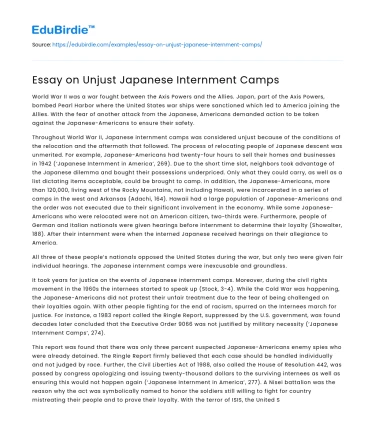World War II was a war fought between the Axis Powers and the Allies. Japan, part of the Axis Powers, bombed Pearl Harbor where the United States war ships were sanctioned which led to America joining the Allies. With the fear of another attack from the Japanese, Americans demanded action to be taken against the Japanese-Americans to ensure their safety.
Throughout World War II, Japanese internment camps was considered unjust because of the conditions of the relocation and the aftermath that followed. The process of relocating people of Japanese descent was unmerited. For example, Japanese-Americans had twenty-four hours to sell their homes and businesses in 1942 (‘Japanese Internment in America’, 269). Due to the short time slot, neighbors took advantage of the Japanese dilemma and bought their possessions underpriced. Only what they could carry, as well as a list dictating items acceptable, could be brought to camp. In addition, the Japanese-Americans, more than 120,000, living west of the Rocky Mountains, not including Hawaii, were incarcerated in a series of camps in the west and Arkansas (Adachi, 164). Hawaii had a large population of Japanese-Americans and the order was not executed due to their significant involvement in the economy. While some Japanese-Americans who were relocated were not an American citizen, two-thirds were. Furthermore, people of German and Italian nationals were given hearings before internment to determine their loyalty (Showalter, 188). After their internment were when the interned Japanese received hearings on their allegiance to America.
Save your time!
We can take care of your essay
- Proper editing and formatting
- Free revision, title page, and bibliography
- Flexible prices and money-back guarantee
All three of these people’s nationals opposed the United States during the war, but only two were given fair individual hearings. The Japanese internment camps were inexcusable and groundless.
It took years for justice on the events of Japanese internment camps. Moreover, during the civil rights movement in the 1960s the internees started to speak up (Stock, 3-4). While the Cold War was happening, the Japanese-Americans did not protest their unfair treatment due to the fear of being challenged on their loyalties again. With other people fighting for the end of racism, spurred on the Internees march for justice. For instance, a 1983 report called the Ringle Report, suppressed by the U.S. government, was found decades later concluded that the Executive Order 9066 was not justified by military necessity (‘Japanese Internment Camps’, 274).
This report was found that there was only three percent suspected Japanese-Americans enemy spies who were already detained. The Ringle Report firmly believed that each case should be handled individually and not judged by race. Further, the Civil Liberties Act of 1988, also called the House of Resolution 442, was passed by congress apologizing and issuing twenty-thousand dollars to the surviving internees as well as ensuring this would not happen again (‘Japanese Internment in America’, 277). A Nisei battalion was the reason why the act was symbolically named to honor the soldiers still willing to fight for country mistreating their people and to prove their loyalty. With the terror of ISIS, the United States were only allowed to deport those who were not an American citizen and if an American citizen with due process of law because of the Civil Liberties Act. Although it took a long time, recognition on these injustices did come to light.
World War II and the Allies victory are events studied today by students. Japanese internment camps are not as widely known and should be included in lessons and history books. There must not be a repeat of the removal of people and the after-effects because of fear and racism.






 Stuck on your essay?
Stuck on your essay?

